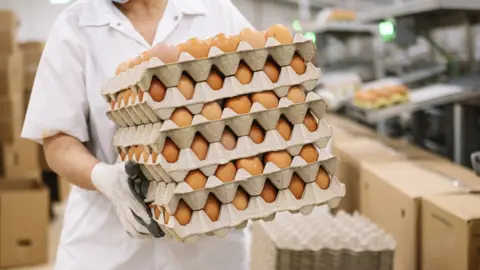Tesco follows other supermarkets in rationing eggs
 Getty Images
Getty ImagesTesco has become the latest supermarket to ration the number of eggs customers can buy due to supply issues.
Customers at the UK's biggest supermarket are now limited to buying only three boxes of eggs, after Asda and Lidl set similar limits last week.
The move comes as UK poultry farmers face rising costs for chicken feed and energy, at a time when they are also being hit by an outbreak of bird flu.
It has led to a squeeze on the supply of eggs to supermarket shelves.
Last week, Tesco said it had good availability with no buying limits but was working with producers to protect supplies.
Now it has introduced a temporary rationing policy, following Lidl's decision to limit the number of egg boxes to three per customer.
Asda has set a two-box limit per customer, but other grocers, such as Sainsbury's and Morrisons are yet to make similar moves.
Sainsbury's has admitted some stores may be running low on some lines and has sourced eggs from Italy, despite previously committing to only buying eggs from British suppliers.
Meanwhile, Morrisons has previously said it was not facing major supply issues.
Like households, farmers have also been hit by soaring energy costs in recent months.
They have also had to fork out more for wheat, a key ingredient in chicken feed, which has spiked as a result of the Ukraine war, with both Russia and Ukraine producing about 30% of the global supply.
As well as rising costs, farmers have been hit by the country's largest ever avian influenza outbreak, which has led to millions of birds being killed or culled in the past 12 months.
Farmers have claimed that despite the price of a dozen eggs rising by about 45p in the supermarkets since March, they've only received between 5p to 10p of that increase and are not being paid a fair price.
The Department for Environment, Food and Rural Affairs (Defra) said it understood the difficulties farmers were facing, and said it was working with the industry to "monitor the market".
"The UK's food supply chain is resilient - there are 38 million laying hens across the country and we are not expecting any significant impact to the overall supply," it added.
